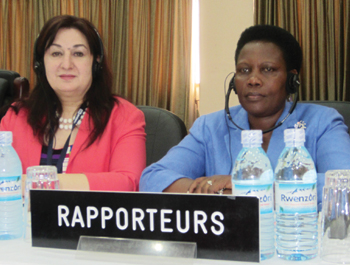Library of Parliament Research Publications
Occasional and Commissioned Papers
Selected Key Themes Addressed in IPU Assemblies
The Health and Well-Being of Women and Children
It must be understood that the rights of women and children are an inalienable, integral and indivisible part of universal human rights. Who would deny we have a responsibility to nurture, protect and develop the world’s children? — Sue Barnes, MP, 1996
Canadian delegates have often used IPU assemblies to address questions related to the health and well-being of women and children, and to remind IPU colleagues of their role in raising awareness about relevant international conventions and treaties and in ensuring that signatories comply with their obligations.
The Human Rights of Women and Children
In 1989 (Budapest), the Canadian delegation submitted a memorandum and a draft resolution on the protection of the rights of children. Margaret Anne Mitchell, MP, served as chairperson and rapporteur of the drafting committee that studied this subject. She stated that Canada called on all nations to take the necessary steps to sign and ratify the Convention on the Rights of the Child. The resolution was adopted unanimously by the assembly.
In 1990 (Punta del Este), the Canadian and Pakistan groups co-sponsored a resolution calling on IPU members to press their governments to implement the commitments agreed to in the Declaration and Plan of Action of the World Summit for Children. The resolution was adopted unanimously.
In 1991 (Pyongyang), the Canadian delegation submitted a memorandum and a draft resolution on violence against women and children. The Canadian text served as the basis for the resolution, which was adopted by consensus. It called on parliaments to enact and governments to enforce legislation prohibiting all forms of violence against children and women and to monitor their application on a regular basis.
In 1996 (Beijing), Canada submitted a memorandum and a draft resolution on promoting greater respect for human rights in general and in particular for those of women and children. Sue Barnes, MP, spoke on this topic: “Women’s rights are human rights. Canada’s commitment to equality for women is rooted in the belief that equal rights for women are an essential component of progress on overall human rights and democratic development.” Some key elements of the Canadian text – references to national human rights institutions, domestic violence, development assistance and the role of non-governmental organizations – were included in the final resolution.
In 1997 (Cairo), Maurice Dumas, MP, spoke about violence against children and emphasized Canada’s strong commitment to protecting and promoting the rights of children, who are the most innocent and vulnerable among us. He reminded his IPU colleagues that there were many international agreements on protection for children.
In 2004 (Mexico City), Senator Marcel Prud’homme spoke during a meeting of the Committee on Peace and International Security:
People everywhere aspire to the same things, including a better life for their children. The IPU should consider encouraging an exchange of women parliamentarians from Israel and Palestine so as to permit them to see how their respective families live, both in Israel and on the Palestinian side. Women, more than men, would no doubt be prone to understand the problems faced by the other side. Reconciliation requires forgiveness for the evils of the past.
In 2001 (Ouagadougou), three Canadian delegates visited a shelter for women who had been expelled from their homes or villages, typically for religious or superstitious reasons. The delegates contributed some personal funds to the project. Dr. Keith Martin, MP, also presented some medications donated by Canadian pharmaceutical companies, as well as clothing for the children living at the shelter.
In 2006 (Nairobi), Senator Raynell Andreychuk spoke about violence against women in situations of conflict. She noted that IPU members can play a role in raising awareness about the Convention on the Elimination of All Forms of Discrimination against Women, the Rome Statute of the International Criminal Court and UN Security Council Resolution 1325 (2000), and ensuring that signatories comply with their obligations.
Maternal and Child Health
In 2010 (Bangkok), Senator Wilbert Keon spoke on the role of parliaments in achieving Millennium Development Goals 4 and 5 relating to child survival and maternal health. He noted that Canada was determined to raise awareness of maternal and child health as one of the key challenges in the field of security and development. He also indicated that few issues were more important, as the United Nations had recognized.
In 2011 (Panama), Senator Salma Ataullahjan was appointed as one of three co-rapporteurs to a standing committee that examined maternal and child health. Their report evaluated progress towards achieving Millennium Development Goals 4 and 5, described key challenges, and summarized relevant international human rights frameworks. In 2012 (Kampala), Senator Ataullahjan drew the committee’s attention to Paragraph 27 of the draft resolution it had submitted, noting that it “requests the IPU to develop an accountability mechanism to monitor the progress of Member Parliaments in implementing the resolution between the date of its adoption and 2015. For the co-rapporteurs, this is a crucial paragraph. We cannot simply make commitments and then move on to other issues at future assemblies.” The final resolution was adopted unanimously by the assembly.

Senator Salma Ataullahjan and Paula Turyahikayo of Uganda, Co-Rapporteurs, 2012 (Kampala) Courtesy of Senator Ataullahjan
My colleague Senator Ataullahjan worked tirelessly for many months to develop a report and draft resolution for the IPU’s Third Standing Committee in collaboration with her co-rapporteurs from Uganda and India. The final resolution ... provides a robust, ambitious and comprehensive framework for parliamentary action on maternal and child health. — Senator Donald H. Oliver, 2012
© Library of Parliament 2012

